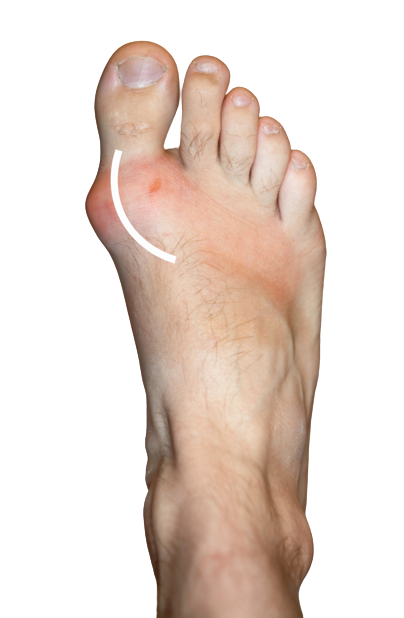Gout
About Gout
Gout is one of the most common causes of painful inflammatory arthritis. It is a chronic or long-term condition that usually affects the toes or joints. There are times when symptoms get worse, known as flares, and times when there are no symptoms, known as remission. Repeated bouts of gout can lead to gouty arthritis, a worsening form of arthritis. The affected area usually becomes painful, swollen or red and unable to bend or bear weight.
What Causes Gout?
Gout is caused by a condition known as hyperuricemia, where there is too much uric acid in the body. The body makes uric acid when it breaks down purines, which are found in your body and the foods you eat such as red meat, seafood or alcohol. When there is too much uric acid in the body, uric acid crystals (monosodium urate) can build up in joints, fluids, and tissues within the body. Hyperuricemia does not always cause gout, and hyperuricemia without gout symptoms does not need to be treated.
Some of the risk factors for gout are as follows:
- Male
- Old age
- Hypertension
- Obesity
- Cardiovascular disease

What Causes Gout?
Gout is caused by a condition known as hyperuricemia, where there is too much uric acid in the body. The body makes uric acid when it breaks down purines, which are found in your body and the foods you eat such as red meat, seafood or alcohol. When there is too much uric acid in the body, uric acid crystals (monosodium urate) can build up in joints, fluids, and tissues within the body. Hyperuricemia does not always cause gout, and hyperuricemia without gout symptoms does not need to be treated.
Some of the risk factors for gout are as follows:
- Male
- Old age
- Hypertension
- Obesity
- Cardiovascular disease
Symptoms Of Gout
Pain
Inflammation and redness
Other Symptoms
Diagnosing Gout
Determining the source of the pain is essential to recommend the right method of treatment and rehabilitation. Here at Singapore Paincare, our team of experienced primary care physicians and pain care specialists will conduct a thorough diagnosis. This includes a physical exam, questions about your symptoms and an evaluation of your medical history. An X-ray may be needed to evaluate or confirm the degree of gout. Gout can only be diagnosed during a flare when an aspiration of the joint fluid subjected to a lab test finds uric acid crystals in the affected joint.
A Message About Gout
Many other medical conditions may mimic gouty arthritis. The signs and symptoms of gout are not specific and can look like signs and symptoms of other inflammatory diseases (e.g. rheumatoid arthritis or degenerative arthritis). The disease should be diagnosed and treated by a doctor or a team of doctors who specialize in caring for gout patients such as Pain Specialists or Rheumatologists.
There is no cure for gout, but you can effectively treat and manage the condition with medication and self-management strategies. The key to gout management is lifestyle management. Eat a healthy diet. Avoid foods that may trigger a gout flare, including foods high in purines (like a diet rich in red meat, organ meat, and seafood), and limit alcohol intake (particularly beer and hard liquor). Overall healthy living such as keeping an active lifestyle, maintaining an ideal BMI and protecting the affected joints will go a long way in gaining remission.
What Treatments Are Available for Gout?
In many instances, non-surgical treatment methods can provide excellent outcomes. At Singapore Paincare, we strive to treat your pain with the least invasive option possible after accurately identifying the cause. Combined with pharmacological treatments and cognitive and physical rehabilitative therapies, we help patients improve functions and prevent pain from recurring.
Non-Surgical Treatment for Gout
Pharmacotherapy
Non-steroidal anti-inflammatory drugs (NSAIDs)
Myospan Intra-articular injection
Surgical Treatments for Gout
Gout is mostly managed with conservative methods. Surgery is not recommended unless the deposits of uric acid have caused irreparable joint damage. As surgery always comes with associated risks, complications and downtime – it may not be suitable for everyone.
Surgery
How Can I Prevent Gout?
To help prevent gout, you can make certain lifestyle changes such as:
- Drinking plenty of water to help your kidneys function better and avoid dehydration
- Exercising regularly to maintain a healthy weight
- Limiting consumption of food and drinks that contain high purine levels (alcohol, red meat, organ meats, shellfish, alcohol, drinks and foods high in fructose)
Get Your Pain Resolved
Send your enquiries or consult our pain experts today.


